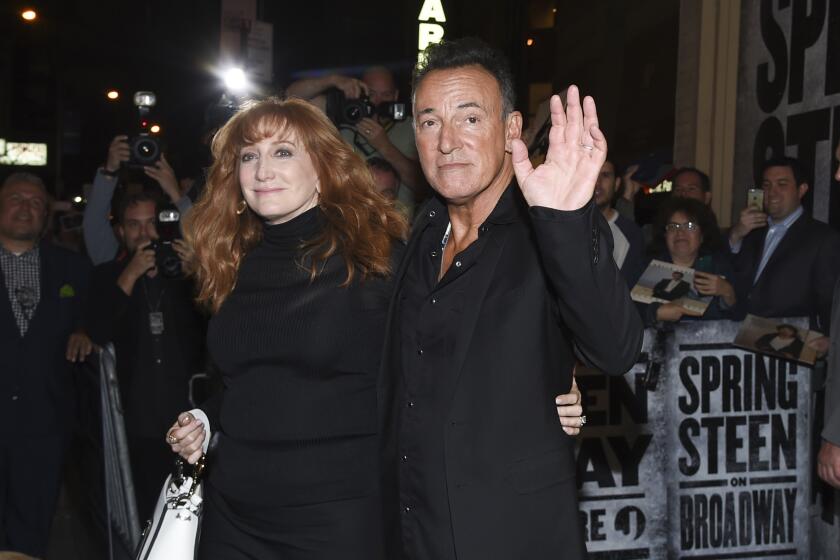MOVIE REVIEW : ‘Midnight’ a Clear-Eyed Anti-War Film
Great war movies never glorify war, even if, sometimes, they praise the courage of the men who fight it. “A Midnight Clear” (at the Hillcrest Cinemas)--not quite a great war movie but certainly a sensitive, bright and supremely moral one--shows how courage itself can be a kind of insanity.
It’s a fable based on fact, and the writer-director, Keith Gordon, endows it with realism that’s heightened, magical. Ardennes, France, at Christmas, 1944, is re-created at Park City, Utah, as if in a glass paperweight ball. Images are crystalline, the characters and speeches as distinct as they might be in a child’s memory.
William Wharton, who wrote the tersely poetic 1982 novel on which the film is based, used his experiences as a soldier in the World War II Army Specialized Training Program--intended for GIs with genius IQs--and the characters were inspired by his platoon mates, few of whom survived the war. The movie shares with the novel a half-surreal, half-photographic quality. The realistically taut dialogue, oddly expunged of profanity, almost clashes with the glassy purity of the images.
Something about the film’s setting suggests a fairy tale: a chateau in a glistening snowy wood full of black skeletal trees and sloping, immaculately white hillsides. The atmosphere is icily clear, semi-fantastical. We see frozen soldiers--German and American--locked in an eternal dance, a Christmas tree covered with lights and grenades, hear voices eerily laughing and chanting “Schlaf gut” (“Sleep well”) out of the darkness.
A sense of anguish and thinly contained rage suffuses the piece. The six platoon mates are a dreamlike, almost stylized community: They include soldiers nicknamed “Mother” (Gary Sinise of Steppenwolf Theater Company) and “Father” (Frank Whaley), a Jew (Arye Gross), a good GI (Kevin Dillon), a fake officer (Peter Berg) and the real leader, Will Knott (Ethan Hawke), whose name has been shortened, puckishly, to “Won’t.”
The Germans are a ragtag squad of boys and old men. The platoon’s leaders include a major (John McGinley) who is stupid, half-crazy and a bellicose liar and coward; sending them out on an idiotic intelligence and reconnaissance mission, then running out when the fighting starts. This is a story about soldiers who try for peace, the love and good will of Christmas, while caught in a brutal, remorseless mechanism.
But there’s a flaw in Wharton’s novel that the film can’t avoid either. It’s never clear why the platoon believes their slightly daffy rapprochement scheme will work, why they don’t have more premonitions of disaster. At a crucial juncture, their high IQs fail them all--possible of course, but something that here seems dictated more by plot than fate.
Gordon doesn’t really try to reconcile this, but, in every other way, his adaptation is exemplary. As in his first feature, “The Chocolate War,” he shows a natural narrative sense, compressing Wharton’s tale lucidly and economically. And, for a low-budget effort like “A Midnight Clear,” it’s hard to imagine a better ensemble. The eight major actors--including Larry Joshua as McGinley’s stoical lieutenant--mesh together expertly and unselfishly. Gordon’s favorite director is Stanley Kubrick, but his film doesn’t suggest the remorselessly mechanical, ironic perfection of a Kubrick war movie, a “Paths of Glory” or “Full Metal Jacket.” Instead, “A Midnight Clear” (rated R for language, war violence and a scene of sensuality) is closer to something Fred Zinnemann might have done: It has some of the same precision, lucent craft and unapologetic humanism. At its best, it’s a barely muted cry against war’s stupidity and injustice. With a clear eye, the movie shows us midnight.
‘A Midnight Clear’
Ethan Hawke: Will Knott
Gary Sinise: “Mother” Wilkins”
Arye Gross: Stan Shutzer
Frank Whaley: “Father” Mundy
A Beacon presentation of an A&M; Films production, released by Interstar Releasing. Director/screenplay Keith Gordon. Producers Dale Pollock, Bill Borden. Executive producers Armyan Bernstein, Tom Rosenberg, Marc Abraham. Cinematographer Tom Richmond. Editor Don Brochu. Costumes Barbara Tfank. Music Mark Isham. Production design David Nichols. Art director David Lubin. Running time: 1 hour, 47 minutes.
MPAA-rated R (language, war violence and a scene of sensuality).
More to Read
Only good movies
Get the Indie Focus newsletter, Mark Olsen's weekly guide to the world of cinema.
You may occasionally receive promotional content from the Los Angeles Times.










